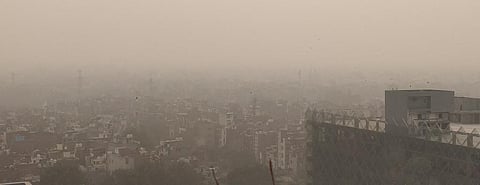Lessons from COVID-19 on reducing India's environmental pollution
The novel coronavirus disease (COVID-19) pandemic poses a cruel choice to the world: the society and economy. It has revealed the vulnerabilities and strengths of every country and has taught us a series of lifelong lessons.
A pattern emerges from analysing the approach of countries that have tackled the COVID-19 outbreak successfully. First, accept the problem. The countries that accepted COVID-19 to be a serious problem and not a hoax, saw a less damaging impact of the disease.
Second, continuously communicate and share the seriousness of the problem with society. People’s faith and cooperation is essential to face such pandemics. Third, take strict measures to save the lives of people, even if it costs you financially in the short term.
Fourth, engage with all stakeholders and take collaborative actions. The world has seen that rich economies that delayed in accepting the problem, failed miserably. On the other hand, countries that were least affected by COVID-19, proactively accepted the problem and followed this process.
Based on this approach, can we in India resolve one of the country's critical issues, environmental pollution?
The first question is, have we accepted the problem? Every year, millions of people die of air, water or land pollution. Every year, nearly 1.2 million people die because of air pollution alone. In Delhi and the National Capital Region (NCR) itself, millions are affected.
One can imagine the enormity and horror of the situation given the fact that 15 out of the world's 20 top-most polluted cities are located in India and there are large number of Indian cities that do not meet the World Health Organization air quality standards.
It is also a well-established that air pollution is a silent killer that affects our lungs and causes serious health problems, especially, in the elderly and children. Still, we haven’t accepted the problem.
Our Union and state governments are not ready to accept the problem unless the National Green Tribunal (NGT) or the Supreme Court issues some order to them or against them. Indeed, it is the judiciary that is driving the environmental debate in India.
For example, the Environment Pollution (Prevention and Control) Authority, a Supreme Court-mandated body, is tasked with taking various measures to tackle air pollution in the NCR. The Implementation of environmental norms in the most polluting coal-based sector seems impossible without the intervention of the Supreme Court.
Second, have we communicated the seriousness of the problem? No. How will we communicate when our government itself says ‘No Indian study has shown any correlation between pollution and the shortening of lifespan’.
In that case, this is the right time to conduct our own Indian health studies to get the correlation of pollution with health, at least in the most polluted cities. Even during the worst days of pollution in Delhi, have we made masks compulsory?
Like COVID-19, we need to communicate with people using a separate portal to share pollution levels, the actions taken and health precautions / advisory for the vulnerable people in society.
Third, our Union or state governments show no spine in taking strict measures against pollution. Because of this, the NGT or the Supreme Court has been taking up these matters, the decision of which is largely delayed since government authorities (like the state pollution control boards or the environment ministry) fail to submit scientific evidences / research and reports.
To save face, government officials bring out standards / notifications or policy decision in haste, without communicating with stakeholders. Such decisions suffocates our industries, especially small- and medium-scale and seriously dent our dreams of ‘Make in India’. And in the end, the court are blamed for taking arbitrary decisions.
Fourth, we need to understand that proactive stakeholder engagement is essential to get an interdisciplinary approach in our policy making. Collective efforts are required to address the issue of environmental pollution. Like COVID-19, government (central or state), industry, and civil society need to work together.
Take the situation of Delhi's pollution. We all know that the governments of Uttar Pradesh, Haryana, Punjab and Delhi need to take collaborative efforts to bring pollution down in Delhi. But has it happened?
For the past five years, we have been choking due to this pollution. Every year, the blame game starts afresh. Like COVID-19, states should be held accountable to at least communicate once in a month about sharing their efforts in reducing pollution.
Remember, pollution is going to come back in a much worse form if we ignore investment required for cleaning our air, water and land. After COVID-19, we need to understand that a growing economy needs to respect the carrying capacity of nature.
By ignoring that, we have already made our cities unlivable with excessive pollution and population, which make us further vulnerable during COVID-19-like pandemics. We are standing on the threshold of various environmental issues.
Lack of environmental planning in expanding our economy is already killing millions and it is going to come back in a much worse form unless its seriousness is accepted and communicated.


